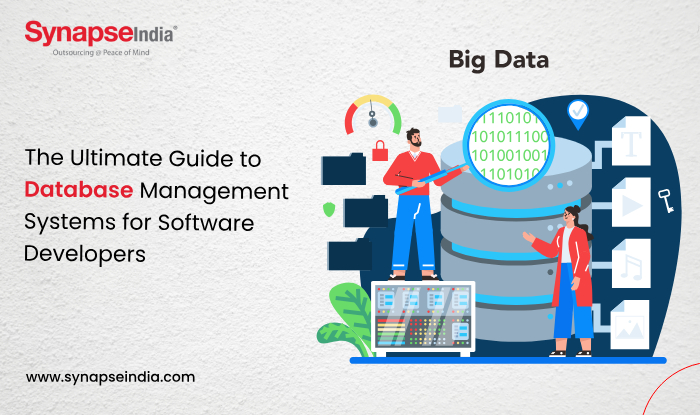 08 Oct 2024
08 Oct 2024“A database management system allows for fast and efficient storage, access, and manipulation of data. But more than that, it also has features to safeguard the security and integrity of data. However, a proper understanding of DBMS is important to harness it to its maximum potential.”

In simple words, a database management system is a software application for storing, retrieving, and managing vast amounts of data in a structured manner. However, taking a profound look at it, a database management system is the core of the data infrastructure of an organization. It is a DBMS that determines how data can be organized, accessed, and manipulated for the best insights and the most beneficial outcomes.
A database management system is a place where data is stored in an organized format and can be fetched by executing a series of well-designed queries. It interacts with end users, applications, and the database to capture and analyze data. By providing a well-organized framework, a database management system enables organizations to effectively organize and manage data that can be used to generate valuable insights and actionable information.
A database is simply a structured collection of data stored in a central location that allows efficient organization and retrieval of data.
A database management system on the other hand is a specific software application made for the efficient management of databases. It comes with a wide range of features and functionality that simplify the storage, retrieval, and manipulation of data.
Database management systems play a crucial role in software. The right DBMS that perfectly aligns with the goals and objectives of an application can have a major impact on its performance, scalability, and overall success.
A DBMS is important to ensure:
Database Management Systems can be broadly categorized into different types based on their data models, architecture, and usage. The primary types of DBMS include:
RDBMS organizes data into tables (relations) that can be linked based on common fields. SQL (Structured Query Language) is typically used for querying and managing data. Popular RDBMS include MySQL, PostgreSQL, Oracle Database, Microsoft SQL Server, etc.
NoSQL databases cater to unstructured and semi-structured data, offering flexibility and scalability. It is further categorized into different types such as document stores, key-value stores, and column-family stores based on how they store and organize data. Popular examples include MongoDB, CouchDB, Redis, and Apache Cassandra.
A hierarchical database was the first DBMS model to be used which organizes data in a tree-like structure. This model enables managing data with a parent-child relationship where each parent can have multiple children, but each child has only one parent.
Another popular type of DBMS is the network database which is similar to but more flexible than hierarchical models. Its ability to handle many-to-many relationships makes it suitable for applications requiring complex relationships.
Cloud-based database management systems provide scalable, flexible, and managed database solutions hosted in the cloud. This approach to data management enables seamless collaboration and access to data from anywhere with an Internet connection, facilitating collaboration and remote work.
There are some important concepts related to database management that every software developer should be familiar with. Check out these key concepts in brief:
A schema defines the structure of the database, including tables, fields, data types, and relationships. The schema of any database management service acts like a blueprint for data organization.
Indexes are data structures that enhance the speed of data retrieval from a DBMS. They allow the optimization of query performance by the creation of indexes on specific columns.
Transactions ensure that a series of operations are completed successfully, adhering to ACID properties.
Normalization is the process by which data is organized to minimize redundancy. It involves breaking large tables into smaller ones that are connected with each other via a pre-defined relationship.
Data modeling is basically the designing of the structure of a database.
Choosing the right DBMS is critical for the success of any software development project. By gaining an in-depth understanding of these databases, software developers can make informed decisions. Here is a detailed overview of some of the best DBMS options for software developers.
MySQL is one of the most popular and widely used open-source relational database management system. It utilizes Structured Query Language (SQL) for data manipulation and retrieval. Its ability to work well with various programming languages, including PHP, Python, and Java makes it popular among software developers.
MySQL is widely used in small to medium-sized applications, especially in web development and is a popular choice for content management systems.
PostgreSQL is an advanced open-source relational database that emphasizes extensibility and SQL compliance. It supports complex queries and a wide array of data types. This database offers support for complex data types, full-text search, and advanced indexing and offers data integrity through transactions.
PostgreSQL is ideal for applications that require complex queries and data integrity, such as financial systems, analytics platforms, and enterprise applications.
SQLite is a lightweight, serverless relational database that is embedded within applications. It is known for its simplicity and minimal setup requirements. Moreover, it is also very easy to deploy as it requires no configuration. This database offers seamless operations on various operating systems without modification. Its high-speed data retrieval makes it ideal for read-heavy operations.
SQLite is commonly used for mobile applications, desktop applications, and during the development phase for testing and prototyping.
MongoDB is a popular NoSQL database designed for scalability and speed. It can handle large volumes of data across distributed clusters. This database allows for dynamic schema changes, making it suitable for evolving data models. It also supports a variety of query types, including aggregation and text search.
MongoDB is well-suited for real-time analytics, content management systems, and applications where data structures frequently change, such as social media platforms.
Microsoft SQL Server is a relational database management system developed by Microsoft, known for its enterprise-level features and integration with other Microsoft tools. It offers excellent performance tuning options and support for large databases. This database includes powerful tools for database management, reporting, and analytics and comes with robust security features.
SQL Server is often used in enterprise applications, business intelligence solutions, and any application requiring robust reporting capabilities.
Oracle Database is a commercial relational database management system known for its high performance, scalability, and enterprise-level features. It is quite popular for its advanced clustering and replication options. This database supports a wide range of data types, indexing methods, and partitioning and also offers comprehensive security features for sensitive data.
Oracle Database is ideal for large enterprises requiring a reliable and scalable database solution, in industries like finance, healthcare, and telecommunications.
Apache Cassandra is a distributed NoSQL database designed for handling large amounts of data across many commodity servers. It is well-known for its scalability features that allow for easy horizontal scalability by adding more servers without downtime. This database offers high availability as it has no single point of failure since data is replicated across multiple nodes.
Cassandra is best suited for applications requiring high availability and large-scale data management, such as IoT applications, real-time analytics, and social media platforms.
Popular for its speed and competence, Redis is an in-memory key-value store database management system. It supports various data structures, including strings, hashes, lists, and sets and also supports various data types beyond simple key-value pairs. This database is extremely fast due to its in-memory nature, making it suitable for caching and real-time analytics.
Redis is ideal for caching, session management, real-time analytics, and applications that require quick data retrieval, such as gaming leaderboards.
SQLite is another relational database management system widely popular among software developers. Its easy integration into applications without the need for a separate server process makes it quite popular among developers. This database is admired for its low resource consumption and the ability to run on various operating systems without modifications.
SQLite is perfect for mobile applications, embedded systems, and small to medium-sized projects where simplicity and efficiency are crucial.
IBM DB2 is a family of data management products that provide a robust relational database management system. It supports various data types and offers strong capabilities for both transactional and analytical workloads. Optimized for high-speed processing and large-scale data handling, this database has built-in support for machine learning and AI-driven insights.
IBM DB2 is suitable for applications where data integrity and performance are critical, like in industries such as finance, healthcare, and retail.
NewSQL is a transformative database trend that provides the best of relational databases and NoSQL. It means that NewSQL databases can offer scalability while maintaining ACID compliance. NewSQL will support applications requiring the scalability of distributed systems along with transactional integrity.
With data lakes, organizations can store vast amounts of raw data in its native format. They will further enable big data analytics and machine learning applications by integrating with tools like Apache Hadoop and Apache Spark.
AI and ML are two futuristic technologies that will bring a plethora of advantages in every domain. Databases are increasingly integrating artificial intelligence (AI) and machine learning (ML) capabilities to enable advanced analytics and predictive modeling.
For any organization, its data is its most asset, well, of course after its clients, that needs effective management at all costs. With a large number of database options available in the market, finding and implementing the best one for you might seem like a daunting task. Depending on the volume and type of data your organization manages, the choice for the DBMS will vary.
With a professional database management service, this daunting task can be made simple. By crafting a database management strategy in alignment with your data requirements, expert database management services can help you stay ahead of your competition.
Database management service can help you with:
They can suggest hardware requirements according to the demands and requirements of your organization for maximum output. They also offer help with selecting apt frameworks and design software architecture as per your business needs.
They can optimize the performance of your database management system to improve its speed and efficiency.
Looking for a smooth transition from one type of database to another, without disrupting normal business operations, database management service can help.
Any problem arising with your database system, new or existing, can be diagnosed and troubleshooted with expert DBMS services.
To ensure a smooth backup and storage without risk of loss, the best database management practices are followed by professional service providers.
To safeguard your valuable data, robust security features are implemented while designing, developing, and installing your database management system.
A basic understanding of database management systems is important for software developers. Familiarity with DBMS types, key concepts, and best practices allows developers to build efficient and scalable applications. By leveraging new technologies, they can further optimize their database solutions. A solid grasp of DBMS principles will empower developers to manage data effectively and contribute to successful software development.


